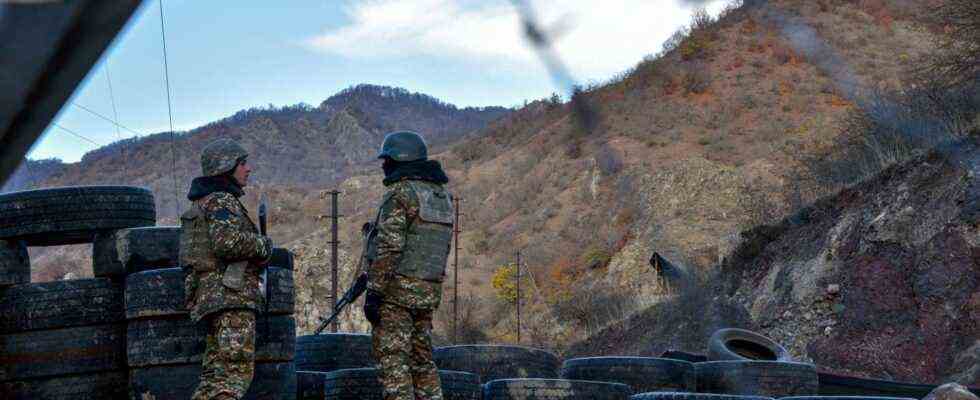After a peak of tensions between the two former Soviet republics, Armenia announced Tuesday, November 16, in the early evening, that it has agreed to a truce with Azerbaijan. “With the mediation of the Russian side, an agreement was reached to end the shooting at the eastern border of Armenia from 6.30 pm” (3:30 p.m. in Paris), the Armenian defense ministry said in a statement.
“The situation has stabilized relatively”, he assured, specifying that an Armenian soldier had been killed in the clashes. Earlier in the day, Armenia said it had suffered loss of life Tuesday in the fighting against Azerbaijan, without giving any results.
“An attack by Azerbaijani forces against the positions of the Armenian forces left the Armenian side dead and injured”, had assured the Ministry of Defense in a first press release.
Yerevan accused of “provoking an escalation of tensions”
The press release also reported on the loss of control of “Two military positions” and the imprisonment of twelve of its soldiers. Armenia also claimed to have inflicted“Significant losses” human rights to Azerbaijani forces. “The fighting continues, their intensity has not diminished”, added the press release. These clashes took place near the disputed region of Nagorno-Karabakh.
For its part, Azerbaijan claimed that Armenian soldiers were leaving their positions, ” panicked “. “Azerbaijani military repelled a counterattack by Armenian forces (…). The Armenian soldiers, frightened and confused, leave their positions ”, assured the Azerbaijani defense ministry in a statement. Baku later reported two Azerbaijani soldiers injured in the fighting on Tuesday, and the foreign ministry accused Yerevan of “Deliberately provoke an escalation of tensions”.
European Council President Charles Michel on Tuesday called on Armenian and Azerbaijani officials to “Urgent de-escalation” and one “Total cease-fire”. The chairman of the body representing the Twenty-Seven, who met with Armenian Prime Minister Nikol Pashinian and Azerbaijani President Ilham Aliev, said in a tweet that the European Union was working with these two partner countries to “Overcome tensions” in view of a “Prosperous and stable South Caucasus”.
Over a year ago, a war and nearly 6,500 dead
These clashes came after weeks of tension between the two former Soviet republics, which regularly report outbreaks of violence and casualties among their armies. Armenia and Azerbaijan had already accused each other of shooting at the border on Sunday. And this despite the signing of a ceasefire agreement and the deployment of Russian peacekeepers after the clashes of 2020.
After the fighting erupted on Tuesday, Yerevan called on Russia for help. “We turn to Russia to ask it to protect the territorial integrity of Armenia”, thus implored the secretary of the Armenian security council, Armen Grigorian.
In the fall of last year, Armenia and Azerbaijan fought a short war, which had left more than 6,500 dead, for the enclave of Nagorno-Karabakh, already the object of a first conflict. bloody in the 1990s. These battles ended in a heavy defeat for Armenia, forced to cede several regions forming a glacis around the separatist enclave.
This defeat was experienced as a trauma by a large part of the Armenian population and continues to shake the political scene in this country today. Several thousand people demonstrated in Yerevan last week to demand the resignation of Prime Minister Nikol Pachinian, who the opposition called “Traitor” for concluding a truce with Baku. For its part, Azerbaijan was able to count on the support of Turkey during this war, which in particular provided it with combat drones.

